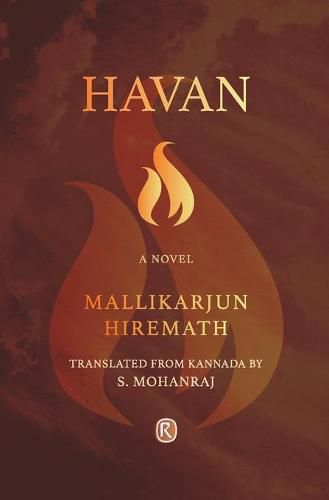Readings Newsletter
Become a Readings Member to make your shopping experience even easier.
Sign in or sign up for free!
You’re not far away from qualifying for FREE standard shipping within Australia
You’ve qualified for FREE standard shipping within Australia
The cart is loading…






This title is printed to order. This book may have been self-published. If so, we cannot guarantee the quality of the content. In the main most books will have gone through the editing process however some may not. We therefore suggest that you be aware of this before ordering this book. If in doubt check either the author or publisher’s details as we are unable to accept any returns unless they are faulty. Please contact us if you have any questions.
‘Havan is about the Lambada people who have been a wandering tribe since ages and who, perhaps, originally belonged to Rajasthan. Literally, Havan is the name of a settlement of Lambadas near Kalluru. The novel describes the lives of a few people of this settlement and faithfully recreates the history of the tribe, its characteristic social events and celebrations, songs and dances, beliefs and customs; and their exploitation by landlords and the police. The first part of the novel is narrated by one Basappa who comes to the Thanda (settlement) as a schoolteacher, and the second part is narrated by Loku, Zimri, Hari and Kasanu - members of the tribe.
'Two streams of thoughts are prevalent in India about the concept of progress among the hundreds of tribes in the country who are culturally rich but suffer from poverty and lack of education. One thought persuades all the communities to join the mainstream by changing their lifestyle, food, clothing, etc., and getting access to modern education and jobs. The other stream argues that the government should provide these people with adequate facilities whereby they can retain their traditional lifestyle as well as food habits and other cultural practices. The first stream is interventionist and the second non-interventionist . Neither the social scientists nor the politicians have been able to decide which of the two is correct . Both the approaches are not without limitations. Havan is emphatic in convincing us that there are no easy solutions to such dilemmas.’
Dr C.N. RAMACHANDRAN (Excerpt from ‘Havana: An Analysis’)
$9.00 standard shipping within Australia
FREE standard shipping within Australia for orders over $100.00
Express & International shipping calculated at checkout
This title is printed to order. This book may have been self-published. If so, we cannot guarantee the quality of the content. In the main most books will have gone through the editing process however some may not. We therefore suggest that you be aware of this before ordering this book. If in doubt check either the author or publisher’s details as we are unable to accept any returns unless they are faulty. Please contact us if you have any questions.
‘Havan is about the Lambada people who have been a wandering tribe since ages and who, perhaps, originally belonged to Rajasthan. Literally, Havan is the name of a settlement of Lambadas near Kalluru. The novel describes the lives of a few people of this settlement and faithfully recreates the history of the tribe, its characteristic social events and celebrations, songs and dances, beliefs and customs; and their exploitation by landlords and the police. The first part of the novel is narrated by one Basappa who comes to the Thanda (settlement) as a schoolteacher, and the second part is narrated by Loku, Zimri, Hari and Kasanu - members of the tribe.
'Two streams of thoughts are prevalent in India about the concept of progress among the hundreds of tribes in the country who are culturally rich but suffer from poverty and lack of education. One thought persuades all the communities to join the mainstream by changing their lifestyle, food, clothing, etc., and getting access to modern education and jobs. The other stream argues that the government should provide these people with adequate facilities whereby they can retain their traditional lifestyle as well as food habits and other cultural practices. The first stream is interventionist and the second non-interventionist . Neither the social scientists nor the politicians have been able to decide which of the two is correct . Both the approaches are not without limitations. Havan is emphatic in convincing us that there are no easy solutions to such dilemmas.’
Dr C.N. RAMACHANDRAN (Excerpt from ‘Havana: An Analysis’)